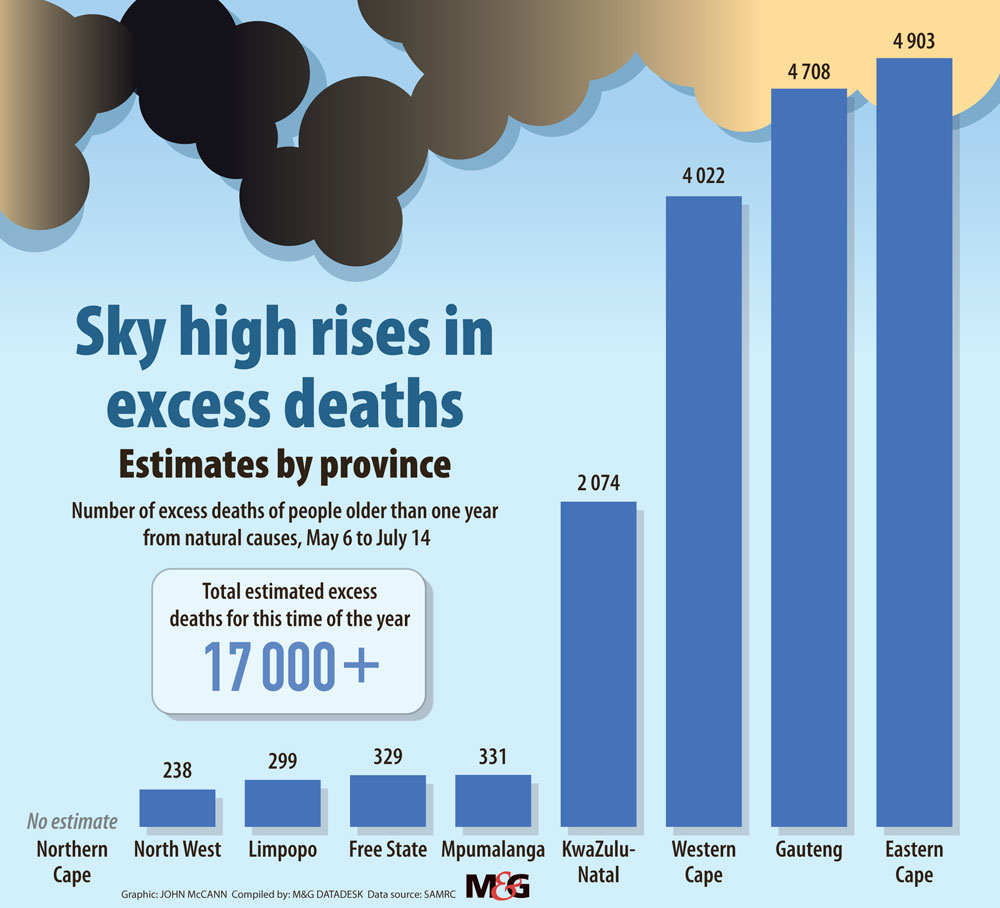Excess deaths increase but we are ‘still in the dark'
There have been 17090 more deaths in the country than there were in previous years during the same period. But the official number of Covid-19 deaths is about 6000. There is a significant departure from the historical trends, even under these abnormal circumstances.
By:M&G Data Desk, 23 July 2020

But the official number of Covid-19 deaths is about 6000.
There is a significant departure from the historical trends, even under these abnormal circumstances.
These numbers are concerning, say experts.
The number of excess deaths has rocketed from about 11000 (May to July 7) to more than 17000, according to the latest weekly report on fatalities in South Africa.
Professor Debbie Bradshaw, from the Medical Research Council of South Africa, says the body has called on the government to look into this, because currently there is no way to be sure what the death certificates state.

'Our reports are shared with the department of health, the minister and the ministerial advisory committee, and we have made them aware of our concerns. But we have a big challenge in the way death registration documents are processed. The doctors fill in the cause of death information on a page that is sealed to ensure that the information remains confidential. Once registered and verified by home affairs, the forms are sent to Stats SA [Statistics South Africa] to compile the national cause of death statistics. The process is very labour intensive. Stats SA released the 2017 cause of death information this year [in] March.'
It will be a long time before this information becomes available for the likes of the council to analyse and provide more concrete reasons as to why the country faces such a high number of excess deaths.
'We are urging the government to see if there are ways to speed up this process. We need further details for us to understand the full story; otherwise, we are all in the dark,' Bradshaw said.
Excess deaths refer to the number of deaths above and beyond what we would have expected to see under 'normal' conditions. According to the council's weekly reports, the number of excess deaths per week is calculated as the number of deaths, natural and unnatural, in that week minus the number that might be assumed to have occurred had the epidemic not occurred.
According to infectious disease specialist Dr Richard Lessells, this is not unusual: most countries that have been hit by the virus have seen such excess deaths leading to the assertions that there is undercounting in many parts of the world.
'The reality is we don't know how many of the deaths are a consequence of the epidemic, lockdown or burden on healthcare and its services. What we can say at the moment is that there is a discrepancy,' Lessells said.
He added that some of the excess deaths are related to Covid-19 deaths, but others may be from different causes.

'Some people may not present themselves to health facilities because of the fear of Covid and are dying at home from things such as strokes and heart attacks. The health systems, in some instances, may be overwhelmed and cannot offer services to everyone.'
'Essentially, we are missing a lot of Covid-19 cases, especially in the communities, because of the testing programme. We have a positivity rate of about 25%. Once you reach a positivity rate of over 10%, you are not doing enough testing and, therefore, we will also miss deaths.'
Though Britain has about 100000 fewer total infections than South Africa, at the beginning of June the country recorded 65000 more deaths, in three months, than usual.
According to The Economist, Spain recorded 43900 excess deaths over four months, although its confirmed Covid-19 deaths were recorded at 28180.
And Italy saw its excess deaths reach 43000 between February and May; Covid-19 deaths during this period were at 32193.
Bradshaw states that although many other countries are dealing with excess deaths associated with the Covid-19 pandemic, she is aware of research conducted showing that some people fear to go to health facilities to collect chronic medication or go to the hospital for treatment.
Thus, she anticipates that some of the excess deaths are not directly due to Covid-19.
On the other hand, she expects that some people may remain untested for Covid-19 until they pass away.
'We know that there is an amount of fear of going to health facilities. We have seen surveys reporting that clients don't want to get their TB [tuberculosis] medication or HIV medication. This may be a cause for the excess numbers. But we think that some of the numbers are definitely Covid-related. There may be some Covid deaths that are not reported,' Bradshaw said.
Although the data currently cannot say whether the excess deaths are all Covid-19 related, the provinces worst hit by the pandemic are those recording the highest number of natural excess deaths.

According to the latest council report, the Western Cape, Eastern Cape, Gauteng and KwaZulu-Natal are experiencing an excess number of deaths.
There is a particularly sharp increase in the Eastern Cape. Compared with the predicted number of deaths from historical data in the week ending July 14 2020, the Eastern Cape had 4900 more deaths, Gauteng, 4708; the Western Cape 4022 and KwaZulu-Natal 2074.
Although these numbers seem to be continuing to track up, Bradshaw said that at least this gives us a picture of the extent of the effects of the pandemic.
In this respect, the number of excess deaths is fairly significant.
News date: 2020-07-23
Links:
https://mg.co.za/news/2020-07-23-excess-deaths-increase-but-we-are-still-in-the-dark/










